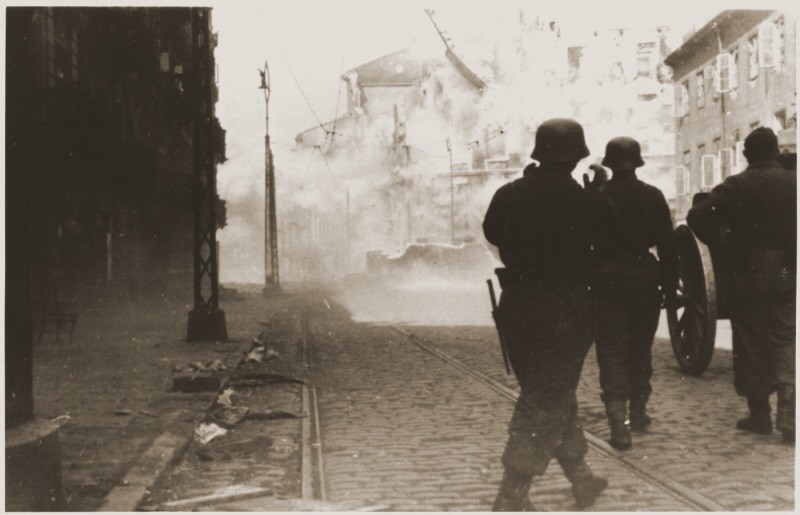
In an article exploring the relationship between social movements and genocide, Aliza Luft suggests that the discipline of genocide studies has been mainly composed of historians who have largely abandoned theoretical explanations of genocide in favor of rich, historical analyses. These historical pieces have broadened the field of genocide studies, focusing on the historical moment and context of each genocide. Luft, using the theoretical perspectives developed by social movement scholars, however, demonstrates how this sociological literature could enhance genocide studies.
I want to make clear that this blog post does not seek to equate social movements with historical or contemporary genocides. It is not my intention to say that social movements are genocides. Rather, I seek to illustrate that these two phenomena operate on a spectrum of contentious politics, and both social movement scholars and genocide scholars may learn more about their respective disciplines by looking at the commonalities and differences between them. Furthermore, I seek to suggest, that maybe genocide scholars could learn a few things by turning to this contemporary moment in the US.
Aliza Luft is not the first to call for a more integrated approach between social movements and mass violence. Social movements and genocide are both types of contentious politics that are centered around changing the status quo — albeit in drastically different ways. While the motives of genocide perpetrators and social movement activists may differ across empirical cases, what remains consistent and worth analyzing are the myriad of ways in which individuals are mobilized and goals are communicated.
So what exactly are contentious politics? Contentious politics are characterized by the government as being an object of claims or the third party to such claims. Claims can be defined as a call for action, and if realized, claims affect the interests of the object (McAdam et al. 2007: 2). Within contentious politics, there are three main properties: political opportunity structures (or more simply, the idea that protests can occur when it is tolerated by the public), collective actors, and performances and repertoires.
Thus, social movements are often included within the scope of contentious politics. Social movements can be understood as sustained challenges to power; these challenges are made in the name of those whom power is held over (McAdam et al. 2007: 19) Given the three properties of contentious politics and the characteristic of claim making, genocide and mass killing also qualify as types of contentious politics; thus contentious politics becomes an umbrella term under which social movements and genocide become linked. What holds these various forms of contention together is the ability of social movements and genocides to mobilize individuals into action regardless of different uses of resources and contexts.
Social movement scholars have called for more comparative casework across different forms of contentious politics. Sidney Tarrow has suggested that these subfields of social movements and contentious politics more broadly are problematic, as they must be considered dynamic and fluid.
For example, Rachel Einwohner, using the example of the Warsaw Ghetto Uprising, demonstrates how collective action can occur under conditions of genocide — in conditions characterized by repression and threat. She demonstrates that social movements and genocide need not be mutually exclusive. Owens and Snow also explore the relationship between genocide, mass violence, and social movements. Using four historical cases of genocide and mass violence, the authors show how these phenomena occur within the context of social movement and political organizations.

Transitions can occur, and often do, between various forms of contention. Mass violence can be perpetrated in response to social movements, as we see with the Arab Spring and ongoing violence in Syria. Social movements can occur within a genocide, as well, as we see with the Warsaw Ghetto Uprising. Genocide and mass violence do not occur in isolation. They do not occur in a vacuum. And thus, it does not make sense or advance the literature to study these phenomena in isolation.
Collective actors operating in genocide are pulling from the same tool kit as those in social movements. Theories regarding the mobilization of participants and the opening and closing of political opportunity structures demonstrate interesting comparisons between these two forms of contentious politics. Perhaps one of the most interesting comparisons centers around the use of framing, or how the movement or government communicates its cause.
Both the fields of genocide studies and social movements could greatly benefit from incorporating various forms of contentious politics, moving past a discourse that seeks to evaluate which types of contentious politics are worthy of comparison. When we stop isolating genocide and look at it in relation to social movements and other forms of contentious politics, we can start to ask why particular forms of contention result in mass violence and others do not. And perhaps, if we stop seeing genocide and mass violence as exceptional and inherently unique, than maybe we can start to consider how genocide is a social movement of the elite.
Perhaps in doing so, we’d be more willing to look at our domestic systems of power and social movements and consider how they relate to the phenomena we study. As someone who studies genocide, I’m often preoccupied with my own research of genocide in Rwanda and mass violence in Sierra Leone, and for many who study genocide, we often look outside of where we call home. Myself, and other genocide scholars, must be more willing to look at the various forms of contentious politics in our own backyard and abroad.
Jillian LaBranche is a Ph.D. Candidate in Sociology and a Research Assistant at the Center for Holocaust and Genocide Studies at the University of Minnesota. Her research interests broadly include violence, knowledge, collective memory, and comparative methods. Her research seeks to understand how societies that recently experienced large-scale political violence teach about this violence to the next generation.

Comments